 W
WDuring the American Civil War, music played a prominent role on both sides of the conflict, Union and Confederate. On the battlefield, different instruments including bugles, drums, and fifes were played to issue marching orders or sometimes simply to boost the morale of one's fellow soldiers. Singing was also employed not only as a recreational activity but as a release from the inevitable tensions that come with fighting in a war. In camp, music was a diversion away from the bloodshed, helping the soldiers deal with homesickness and boredom. Soldiers of both sides often engaged in recreation with musical instruments, and when the opposing armies were near each other, sometimes the bands from both sides of the conflict played against each other on the night before a battle.
 W
W"All Quiet Along the Potomac Tonight" is a poem by American writer Ethel Lynn Beers.
 W
W"Aura Lea" is an American Civil War song about a maiden. It was written by W. W. Fosdick (lyrics) and George R. Poulton (music) but sometimes is attributed to Stephen Foster. The melody was used in Elvis Presley's 1956 hit song "Love Me Tender".
 W
WThe "Battle Cry of Freedom", also known as "Rally 'Round the Flag", is a song written in 1862 by American composer George Frederick Root (1820–1895) during the American Civil War. A patriotic song advocating the causes of Unionism and abolitionism, it became so popular that composer H. L. Schreiner and lyricist W. H. Barnes adapted it for the Confederacy.
 W
WThe "Battle Hymn of the Republic", also known as "Mine Eyes Have Seen the Glory" outside of the United States, is a popular American patriotic song by the abolitionist writer Julia Ward Howe.
 W
W"The Bonnie Blue Flag", also known as "We Are a Band of Brothers", is an 1861 marching song associated with the Confederate States of America. The words were written by the entertainer Harry McCarthy, with the melody taken from the song "The Irish Jaunting Car". The song's title refers to the unofficial first flag of the Confederacy, the Bonnie Blue Flag. The left flag on the sheet-music is the Bonnie Blue Flag.
 W
W"Columbia, the Gem of the Ocean" is an American patriotic song which was popular in the United States during the 19th and early 20th centuries. Composed c. 1843, it was long used as an unofficial national anthem of the United States, in competition with other songs. Under the title "Three Cheers for the Red, White, and Blue," the song is mentioned in Chapter IX of MacKinlay Kantor's Pulitzer Prize-winning novel Andersonville (1955). It was also featured in the 1957 musical The Music Man. In 1969, "Columbia, the Gem of the Ocean" was the music performed by a U.S. Navy Band embarked aboard USS Hornet as one of the ship's helicopters recovered the Apollo 11 astronauts from their capsule named Columbia after a splashdown in the Pacific Ocean.
 W
W"The Conquered Banner" was one of the most popular of the post-Civil War Confederate poems. It was written by Roman Catholic priest and Confederate Army chaplain, Father Abram Joseph Ryan, who is sometimes called the "poet laureate of the postwar south" and "poet-priest of the Confederacy".
 W
W"Dixie", also known as "Dixie's Land", "I Wish I Was in Dixie", and other titles, is a song about the Southern United States first made in the mid-19th century. It is one of the most distinctively Southern musical products of the 19th century and probably the best-known song to have come out of blackface minstrelsy. It was not a folk song at its creation, but it has since entered the American folk vernacular. The song likely cemented the word "Dixie" in the American vocabulary as a nickname for the Southern U.S.
 W
WDixie Doodle was a popular parody of Yankee Doodle in the South at the time of the American Civil War. It was written in 1862 by Margaret Weir, published in New Orleans, and dedicated to "our dear Soldiers on the Battle Field".
 W
W"God Save the South" is a poem-turned-song written by American George Henry Miles, under the pen name Earnest Halphin, in 1861. It is considered by some to have been the unofficial national anthem of the Confederate States of America. The commonly heard version was composed by Charles W. A. Ellerbrock, while C. T. De Cœniél later composed a different tune for the song.
 W
W"Goober Peas" is a traditional folk song probably originating in the Southern United States. It was popular with Confederate soldiers during the American Civil War, and is still sung frequently in the South to this day. It has been recorded and sung by scores of artists, including Burl Ives, Tennessee Ernie Ford, Rusty Draper and The Kingston Trio.
 W
W"Hard Tack, Come Again No More" is an American Civil War-era parody of the song "Hard Times, Come Again No More." First called "Hard Crackers, Come Again No More!", it is a sarcastic complaint about the quality of some of the provisions provided by military contractors. The authors of the many verses of the parody are unknown, although the first version is often attributed to Josiah Fowler of the First Iowa Infantry dating to just after the Battle of Boonville, June 1861.
 W
W"Hold on Abraham!" is a popular song dating from 1862, during the time of the American Civil War. The song is fast paced and repetitive, and, at the time of its popularity, was often performed by minstrels. The words and lyrics were composed by William Batchelder Bradbury.
 W
W"Home, Sweet Home" is a song adapted from American actor and dramatist John Howard Payne's 1823 opera Clari, or the Maid of Milan, the song's melody was composed by Englishman Sir Henry Bishop with lyrics by Payne. Bishop had earlier published a more elaborate version of this melody, naming it "A Sicilian Air", but he later confessed to having written it himself.
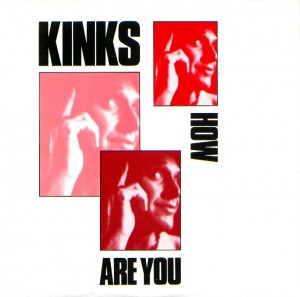 W
W"How Are You" is the seventh track on the album, Think Visual, released by The Kinks in 1986. It was written by Ray Davies.
 W
W"I'm a Good Ol' Rebel", also called "The Good Old Rebel", is a pro-Confederate folk song and rebel song commonly attributed to Major James Innes Randolph. It was initially created by Randolph as a poem before evolving into an oral folk song and was only published in definitive written form in 1914.
 W
W"John Brown's Body" is a United States marching song about the abolitionist John Brown. The song was popular in the Union during the American Civil War. The tune arose out of the folk hymn tradition of the American camp meeting movement of the late 18th and early 19th century. According to an 1889 account, the original John Brown lyrics were a collective effort by a group of Union soldiers who were referring both to the famous John Brown and also, humorously, to a Sergeant John Brown of their own battalion. Various other authors have published additional verses or claimed credit for originating the John Brown lyrics and tune.
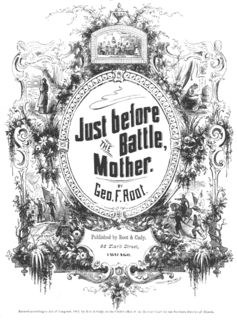 W
W"Just before the Battle, Mother" was a popular song during the American Civil War, particularly among troops in the Union Army. It was written and published by Chicago-based George F. Root. It was also a popular song with adherents of the Primrose League in England, and was a central part of Victoria Day celebrations in Canada during the late 19th and early-to-mid 20th centuries.
 W
W"Kathleen Mavourneen" is a song written in 1837, composed by Frederick Crouch with lyrics by a Mrs. Crawford. Crawford's name is variously cited as Annie, Julia, Louise Macartney, Louise Matilda Jane, or Marion; Crouch is also sometimes incorrectly cited as the author of the song's lyrics. It was popular during the American Civil War. "Mavourneen" is a term of endearment derived from the Irish Gaelic mo mhuirnín, meaning "my beloved".
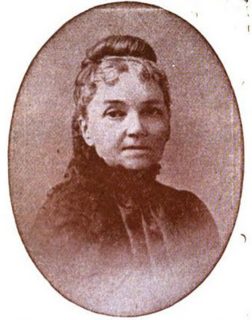 W
WAnnie Chambers Ketchum was an American educator, lecturer, and writer. She was a member of the New York Academy of Sciences and became a Capitular Tertiary of St. Dominic in her later years. Chambers served as principal of the High School for Girls in Memphis, Tennessee, where she established a girls school. She opened a normal school for advanced pupils in Georgetown, Kentucky.
 W
W"Kingdom Coming", also known as "The Year of Jubilo", is an American Civil War song, written and composed by Henry C. Work in 1862, prior to the issuing of the Emancipation Proclamation by U.S. President Abraham Lincoln.
 W
W"Marching Song of the First Arkansas Colored Regiment" is one of the few Civil War-era songs inspired by the lyrical structure of "The Battle Hymn of the Republic" and the tune of "John Brown's Body" that is still performed and recorded today. The "Marching Song" has been described as "a powerful early statement of black pride, militancy, and desire for full equality, revealing the aspirations of black soldiers for Reconstruction as well as anticipating the spirit of the civil rights movement of the 1960s." The song's lyrics are attributed to the regiment's white officer, Captain Lindley Miller. An almost identical song, "The Valiant Soldiers," is attributed to Sojourner Truth in post-Civil War editions of her Narrative. Recent scholarship supports Miller as the original author, or at least compiler, of the song.
 W
W"Marching Through Georgia" is a marching song written by Henry Clay Work at the end of the American Civil War in 1865. The title and lyrics of the song refer to U.S. Army major general William T. Sherman's "March to the Sea" to capture the Confederate city of Savannah, Georgia in late 1864.
 W
W"Maryland, My Maryland" was the state song of the U.S. state of Maryland from 1939 to 2021. The song is set to the melody of "Lauriger Horatius" — the same tune "O Tannenbaum" was taken from. The lyrics are from a nine-stanza poem written by James Ryder Randall (1839–1908) in 1861. The state's general assembly adopted "Maryland, My Maryland" as the state song on April 29, 1939. After more than ten attempts to change the state song, over 40 years, on March 22, 2021, both houses of the General Assembly voted by substantial margins to abandon "Maryland, My Maryland" as the state song without a replacement. On May 18, 2021, Governor Larry Hogan signed the bill.
 W
W"The Minstrel Boy" is an Irish patriotic song written by Thomas Moore (1779–1852) who set it to the melody of The Moreen, an old Irish air. It is widely believed that Moore composed the song in remembrance of a number of his friends, whom he met while studying at Trinity College, Dublin and who had participated in the Irish Rebellion of 1798. However this has never been definitively proved and the tune is also played by the British Army and Orange Order flute bands. The song gained widespread popularity and became a favourite of many Irishmen who fought during the American Civil War and gained even more popularity after World War I. The song is notably associated with organisations that historically had a heavy representation of Irish-Americans, in particular the police and fire departments of New York, Boston and Chicago and those of various other major US metropolitan areas, even after those organisations have ceased to have a substantial over-representation of personnel of Irish ancestry. The melody is frequently played, typically on bagpipes, at funerals of members and/or officers of such organisations who have died or been killed in service. Unsurprisingly, given its lyrics, it is also associated with the Irish Army and with traditionally Irish regiments in the armies of the United Kingdom and the United States as well as other armies of the world. It is Roud Folk Song Index no. 13867.
 W
W"Roll, Alabama, Roll" is an American-British sea shanty of the nineteenth century. It is based on the exploits of the CSS Alabama, a sloop-of-war of the Confederate States Navy which enjoyed success as a commerce raider against Union shipping during the American Civil War.
 W
W"Root hog or die" is a common American catch-phrase dating at least to the early 1800s. Coming from the early colonial practice of turning pigs loose in the woods to fend for themselves, the term is an idiomatic expression for self-reliance.
 W
W"Stonewall Jackson's Way" is a poem penned during the American Civil War that later became a well-known patriotic song of the Confederate States and the Southern United States. It became very popular, but its authorship was unknown until almost 25 years later.
 W
W"Taps" is a bugle call played at 2100 hrs during flag ceremonies and at military funerals by the United States Armed Forces. The official military version is played by a single bugle or trumpet, although other versions of the tune may be played in other contexts. It is also performed often at Girl Guide, Girl Scout, and Boy Scout meetings and camps. The tune is also sometimes known as "Butterfield's Lullaby", or by the first line of the lyric, "Day Is Done". The duration may vary to some extent.
 W
W"Tenting on the Old Camp Ground" was a popular song during the American Civil War. A particular favorite of enlisted men in the Union army, it was written in 1863 by Walter Kittredge and first performed in that year at Old High Rock, Lynn, Massachusetts.
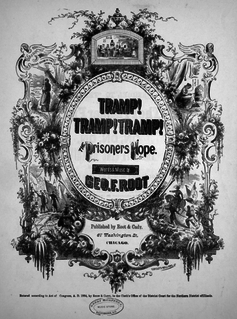 W
W"Tramp! Tramp! Tramp! " was one of the most popular songs of the American Civil War. George F. Root wrote both the words and music and published it in 1864 to give hope to the Union prisoners of war. The song is written from the prisoner's point of view. The chorus tells his fellow prisoners that hope is coming.
 W
W"Turkey in the Straw" is an American folk song that first gained popularity in the early 19th century.
 W
W"We Are Coming, Father Abra'am", is a poem written by James S. Gibbons, set to music by eight different composers, including Stephen Foster. William Cullen Bryant published one version (with music by Luther Orlando Emerson. Bryant's newspaper originally published the poem and, because it was originally published anonymously, many assumed it was his, and it was widely republished, so Bryant issued a statement denying his authorship. The poem and music came in response to a call by Abraham Lincoln on July 1, 1862 for volunteers to fight for the U.S. in the American Civil War.
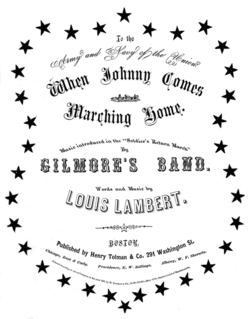 W
W"When Johnny Comes Marching Home", sometimes "When Johnny Comes Marching Home Again", is a popular song from the American Civil War that expressed people's longing for the return of their friends and relatives who were fighting in the war.
 W
W"The Yellow Rose of Texas" is a traditional American folk song dating back to at least the 1850s. Members of the Western Writers of America chose it as one of the Top 100 Western songs of all time. Several versions of the song have been recorded, including by Elvis Presley, Willie Nelson and Mitch Miller.